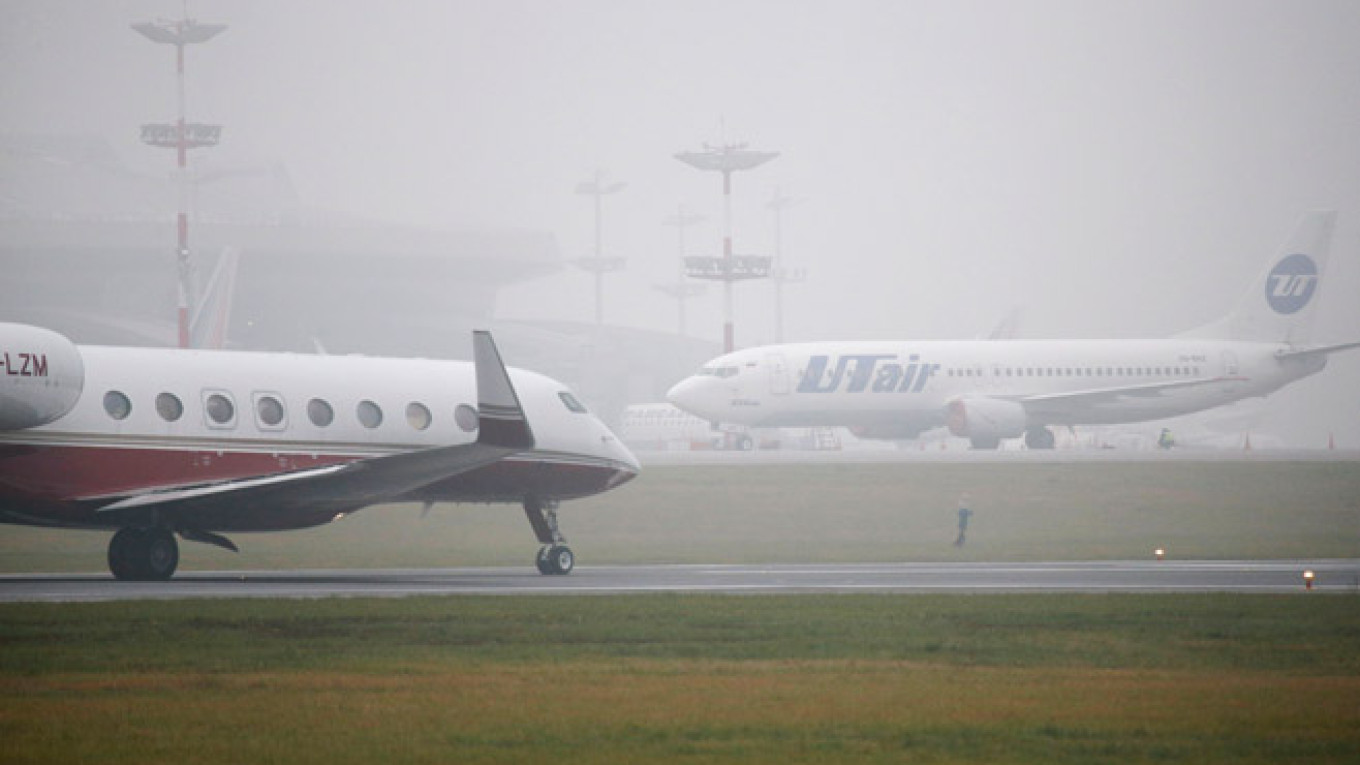The crumbling value of the ruble currency is raising the cost of air travel and train journeys out of Russia, forcing major transport companies to either hike prices or close down unprofitable routes.
Demand for travel outside Russia is shriveling as the economy teeters on the edge of recession, and the ruble, which has lost over a third of its value this year, continues to slide.
UTair, Russia's third-largest airline, has been hit this week with lawsuits over debt repayment difficulties brought on by the economic downturn, while Russian Railways, the country's sprawling state rail firm, is cutting most of its routes to former Soviet states to staunch losses. ?
Federal Passenger Company, Russian Railways' long-distance passenger train operator, said it would cancel trains to Ukraine, Kazakhstan, Azerbaijan and Tajikistan, Interfax reported Monday, citing Russian Railways' press service.
Nadir Azmamedov, a spokesman for Azerbaijan Railways, said earlier on Monday that the Federal Passenger Company canceled trains from Moscow to Baku starting from mid-December because they were "economically unviable."
Repeated calls to the Federal Passenger Company were left unanswered on Tuesday, but the company's train schedule until the end of the year still has open booking for Moscow-to-Kiev return tickets. There is no option, however, to purchase tickets from Moscow to Baku starting from mid-December.
Russian Railways expects a loss of 2 billion rubles ($37 million) from its international rail transportation services this year, business daily Kommersant reported Tuesday, citing undisclosed sources in the company.
Declining revenue was partly due to the weakening ruble, a source told the newspaper.
Prices for international train tickets are tied to the euro, which has appreciated almost 50 percent against the ruble since the beginning of the year.
"The ongoing economic crisis is pushing down the ruble, which together with surging inflation means increased costs for transport companies and decreased demand for services from passengers," said Dmitry Baranov, lead analyst at consultancy Finam Management.
According to Russian Railways, demand for long-distance train travel in November decreased 7.6 percent compared with the same period last year.
No Trains, No Planes
Airlines are also facing falling revenues due to the ruble, which is losing value faster than airlines are willing to raise their prices.
Airline ticket prices for international flights into and out of Russia were hiked by 12.5 percent last week, Russia's Association of Tour Operators reported, following a year-on-year increase of 17 percent in November, according to online booking company Biletix.
But airlines were not responsible for the price hike because they have not increased their tariffs, Dmitry Gorin, vice president of the Association of Tour Operators, said in a statement last week — the ruble, which has lost a third of its value this year, was to blame.
Vitaly Savelyev, head of Russia's flagship airline Aeroflot, said last week the company would not increase prices for fear of losing passengers.
But current tariffs are "economically unviable," Savelyev was quoted by TASS news agency as saying.
One way to fight losses, he said, would be to follow the example of U.S. airlines, which made a joint decision to ground part of their fleet in an attempt to decrease excess supply and increase prices after the terrorist attack in 2001 sharply reduced demand for air travel. ?
Growing prices and the uncertainty over the exchange rate of the ruble have been curbing passenger traffic and outbound foreign tourism in Russia, analysts said.
The Association of Tour Operators expects the demand for tourism abroad to fall 40 percent by the end of the year. According to the head of the association, Maya Lomidze, lack of demand will kill a third of Russia's tour operators next year.
But tourism inside the country is growing, she said. Despite the fact that prices for tours in Russia have grown by a third since the beginning of the year, demand for them has increased by 1.5 times, Lomidze said.
Contact the author at a.panin@imedia.ru
A Message from The Moscow Times:
Dear readers,
We are facing unprecedented challenges. Russia's Prosecutor General's Office has designated The Moscow Times as an "undesirable" organization, criminalizing our work and putting our staff at risk of prosecution. This follows our earlier unjust labeling as a "foreign agent."
These actions are direct attempts to silence independent journalism in Russia. The authorities claim our work "discredits the decisions of the Russian leadership." We see things differently: we strive to provide accurate, unbiased reporting on Russia.
We, the journalists of The Moscow Times, refuse to be silenced. But to continue our work, we need your help.
Your support, no matter how small, makes a world of difference. If you can, please support us monthly starting from just $2. It's quick to set up, and every contribution makes a significant impact.
By supporting The Moscow Times, you're defending open, independent journalism in the face of repression. Thank you for standing with us.
Remind me later.


